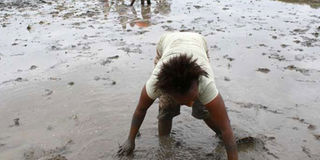Diversion of water hurts rice growers

Rice farmers prepare paddies for planting at Mwea in Kirinyaga County on August 14, 2015. The 7,000 rice farmers in the Mwea scheme are worried over the biting drought. PHOTO | JOSEPH KANYI | NATION MEDIA GROUP
What you need to know:
- Mr Kang’ara said the situation is serious and warned that horticultural farmers involved in the diversion would be dealt with ruthlessly.
- It has adversely affected the rice crop at the scheme, raising fears that the farmers may incur a loss of Sh1.4 billion this season.
Horticultural farmers are diverting the little available water from major rivers, worsening the supply crisis at the Mwea Rice Irrigation Scheme in Kirinyaga County.
According to a Tana Water Services Board director, Mr Mureithi Kang’ara, growers in the upper zone were diverting water to their farms, making it difficult for their colleagues in the scheme to irrigate rice.
The crop is now wilting due to a prolonged dry spell.
He said the volume of water in the Nyamindi and Thiba rivers, the main sources of supply to the irrigation scheme, has gone down drastically.
The scheme, which is the country’s rice granary, is believed to be the largest in East and Central Africa.
It produces 80 per cent of the best aromatic Pishori rice consumed nationally.
Mr Kang’ara said the situation is serious and warned that horticultural farmers involved in the diversion would be dealt with ruthlessly.
“Those diverting water at the expense of rice farmers will be arrested,” he told the Nation on the phone.
He said the board is monitoring the situation before it apprehends the wrongdoers.
“It is illegal to divert water and those involved will not be spared,” said Mr Kang’ara.
The 7,000 rice farmers in the scheme are worried over the biting drought.
It has adversely affected the rice crop at the scheme, raising fears that the farmers may incur a loss of Sh1.4 billion this season.
When the weather is favourable and the prices are good, the rice farmers rake in Sh7 billion per season.
Farmers usually harvest 1 million bags of unprocessed rice every season.





